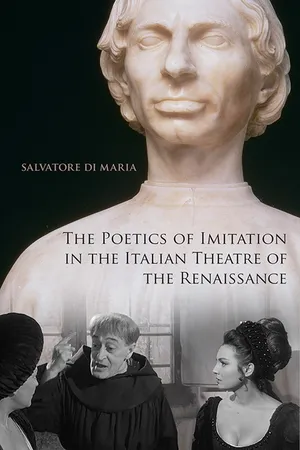
This is a test
- 256 pages
- English
- PDF
- Available on iOS & Android
eBook - PDF
The Poetics of Imitation in the Italian Theatre of the Renaissance
Book details
Table of contents
Citations
About This Book
DiMaria delves into how playwrights not only brought inventive new dramaturgical methods to the genre, but also incorporated significant aspects of the morals and aesthetic preferences familiar to contemporary spectators into their works.
Frequently asked questions
At the moment all of our mobile-responsive ePub books are available to download via the app. Most of our PDFs are also available to download and we're working on making the final remaining ones downloadable now. Learn more here.
Both plans give you full access to the library and all of Perlego’s features. The only differences are the price and subscription period: With the annual plan you’ll save around 30% compared to 12 months on the monthly plan.
We are an online textbook subscription service, where you can get access to an entire online library for less than the price of a single book per month. With over 1 million books across 1000+ topics, we’ve got you covered! Learn more here.
Look out for the read-aloud symbol on your next book to see if you can listen to it. The read-aloud tool reads text aloud for you, highlighting the text as it is being read. You can pause it, speed it up and slow it down. Learn more here.
Yes, you can access The Poetics of Imitation in the Italian Theatre of the Renaissance by Salvatore Di Maria in PDF and/or ePUB format, as well as other popular books in Literatura & Arte dramático antiguo y clásico. We have over one million books available in our catalogue for you to explore.
Information
Table of contents
- Contents
- Preface
- Chapter One. Imitation: The Link between Past and Present
- Chapter Two. Machiavelli’s Mandragola
- Chapter Three. Clizia: From Stage to Stage
- Chapter Four. Cecchi’s Assiuolo: An Apian Imitation
- Chapter Five. Groto’s Emilia: Fiction Meets Reality
- Chapter Six. Gli duoi fratelli rivali: Della Porta Adapts Bandello’s Prose Narrative to the Stage
- Chapter Seven. Orbecche: Giraldi’s Imitation of His Own Prose Narrative
- Chapter Eight. Dolce’s Marianna: From History to the Stage
- Conclusion
- Notes
- Bibliography
- Index